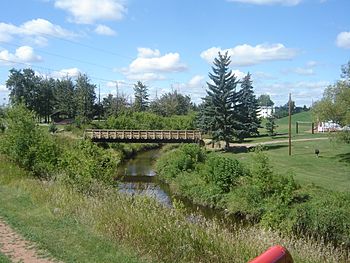Vermilion River (Alberta) facts for kids
Quick facts for kids Vermilion River |
|
|---|---|

The Vermilion River in Vegreville
|
|
| Country | Canada |
| Province | Alberta |
| Physical characteristics | |
| Main source | Central Alberta 690 m (2,260 ft) 53°08′17″N 111°55′23″W / 53.13806°N 111.92306°W |
| River mouth | North Saskatchewan River 510 m (1,670 ft) 53°39′34″N 110°20′08″W / 53.65944°N 110.33556°W |
| Length | 255 km (158 mi) |
The Vermilion River is a river located in east-central Alberta, Canada. It is a branch, or tributary, of the larger North Saskatchewan River. The river flows through an area called the County of Vermilion River, which was named after it. People say the river got its name from the special red clay found along its banks.
Journey of the Vermilion River
The Vermilion River starts from melting snow and rain south of the town of Vegreville. It flows towards the northeast through Vegreville. The river continues in this direction until it reaches the town of Two Hills. Here, it turns and flows southeast.
River Features and Length
Near the town of Vermilion, a dam creates a reservoir on the river. After this, the river changes direction again, flowing northeast. It finally joins the North Saskatchewan River about 16 km north of Marwayne.
The Vermilion River is about 255 km (158 mi) long. Before it meets the North Saskatchewan River, its average water level is about 16.5 m (54 ft). A special place called Vermilion Provincial Park is located along the river's banks.
Fish in the Vermilion River
The Vermilion River is home to several types of fish. These include the speedy northern pike and the small fathead minnow. You can also find the lake chub, the unique brook stickleback (scientific name: Culaea inconstans), and the longnose dace. Another common fish here is the white sucker.
If you enjoy fishing, remember that there are rules for fishing in this river. These rules are part of the North Saskatchewan Tributaries fishing regulations. They help keep the fish populations healthy.
 | Bayard Rustin |
 | Jeannette Carter |
 | Jeremiah A. Brown |

